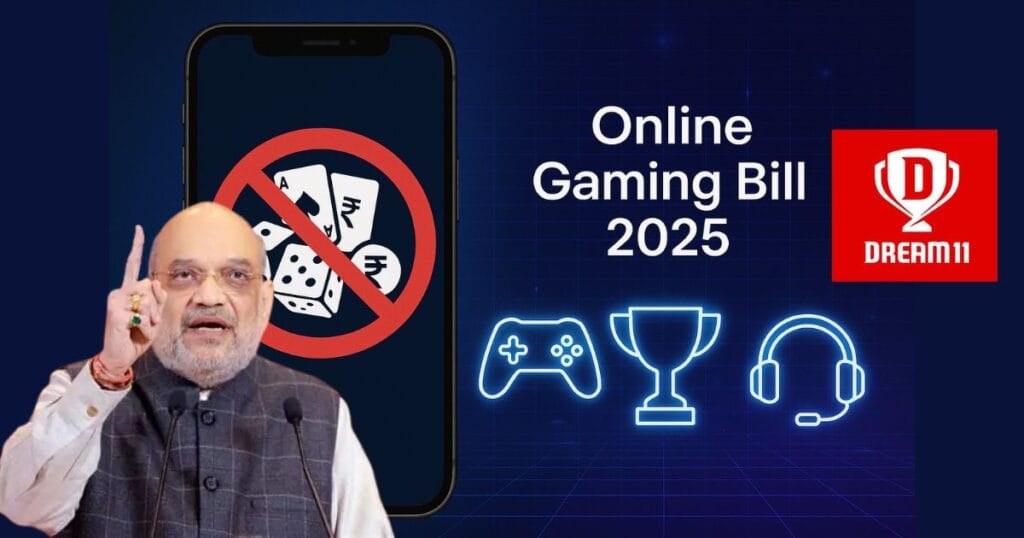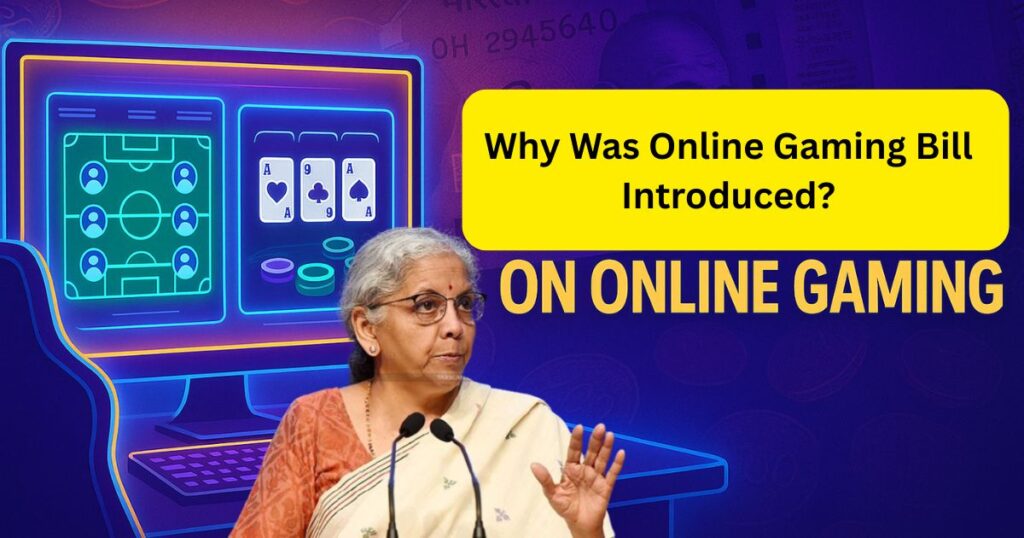Online gaming in India is growing rapidly. Millions of people play games on their phones and computers, but some games cause problems like financial loss, addiction, and fraud. To tackle this, the Indian government introduced the Promotion and Regulation of Online Gaming Bill, 2025. This bill was passed in the Lok Sabha on August 20, 2025, and is now headed to the Rajya Sabha for discussion. If approved by the President, it will become law.

In this article, we’ll break down the bill. We’ll cover who it affects, what penalties are involved, and what happens to e-sports and other games. Our goal is to make this comprehensive, useful, and easy to understand, so you get all the information in one place.
Purpose of the Bill: Stop Money Gaming, Promote Safe Games
The Online Gaming Bill 2025 has two main goals:
- Ban Money Gaming Completely: Money gaming refers to online games where players bet money to win cash or prizes. Examples include fantasy sports like Dream 11, online poker, rummy, or betting games. Whether these games are based on skill (using your brain) or chance (like gambling), they will all be banned.
- Support E-Sports and Social Games: The government wants to promote e-sports (like PUBG or BGMI tournaments), educational games (that teach something), and social games (like Candy Crush). These will be regulated to ensure they grow safely and responsibly.
Key Terms Explained:
- Banned = Completely stopped or prohibited.
- Regulated = Controlled by rules.
- E-Sports = Professional gaming where players compete in tournaments.
The government says money gaming leads to addiction, financial losses, and illegal activities like money laundering. This bill aims to protect people while encouraging safe gaming.
Key Highlights of Online Gaming Bill: At a Glance
- What’s Banned? All games where you bet money, like Dream 11, online poker, or lotteries.
- What’s Promoted? E-sports, social games, and educational games will get government support.
- Penalties? Companies running money gaming, advertising it, or processing payments face up to 3 years in jail and a ₹1 crore fine.
- Players Safe: People who play games won’t face any penalties.
- Regulatory Authority: A central body will be formed to monitor online gaming.
Example: If you play Dream 11, you won’t get in trouble. But the company running Dream 11, its advertisers, or the bank handling payments could face penalties.
Who Will Be Affected from Online Gaming Bill?
1. Service Providers (Gaming Platforms)
Apps or websites that offer money gaming will fall under this bill. Examples include:
- Dream 11, MPL, or other fantasy sports apps.
- Online poker, rummy, or casino games.
If these companies run money gaming, they could face 3 years in jail and a fine of up to ₹1 crore. Repeated violations could lead to 5 years in jail and a ₹2 crore fine.
2. Advertisers (Promoters)
Anyone promoting money gaming will also be targeted. This includes:
- TV ads for Dream 11.
- YouTube or Instagram promotions for gaming apps.
- Celebrities or influencers saying, “Play this app and win lakhs!”
Penalty: Up to 2 years in jail and/or a ₹50 lakh fine.
3. Banks and Payment Gateways
Banks or payment companies (like Paytm, Google Pay) that process transactions for money gaming will be held accountable. If they facilitate such payments, they could face 3 years in jail and a ₹1 crore fine.
Key Terms:
- Payment Gateway = A service that handles online money transfers, like Paytm.
- Accountable = Responsible and liable for penalties.
4. Impact on Players?
Good news! If you play money gaming, you won’t face any penalties. The bill targets companies, advertisers, and banks, not players. So, if you’ve spent ₹100 on Dream 11, you’re safe. But the company, its advertisers, or the bank handling your payment could be in trouble.
Example:
- Played online rummy? You’re safe.
- But the rummy app, its advertisers, and the bank processing payments could face penalties.
ALSO READ- New Law in Indian Politics: Ministers Must Resign After 30 Days in Jail
Penalties and Fines: How Strict Are They?
The Online Gaming Bill lays out tough penalties to ensure compliance. Here’s a detailed look:
- Running or Facilitating Money Gaming:
- Penalty: Up to 3 years in jail and/or a ₹1 crore fine.
- Example: An app that lets users bet money to play games.
- Advertising Money Gaming:
- Penalty: Up to 2 years in jail and/or a ₹50 lakh fine.
- Example: A TV or social media ad promoting a money gaming app.
- Payment Processing for Money Gaming:
- Penalty: Up to 3 years in jail and/or a ₹1 crore fine.
- Example: A payment gateway like Paytm processing transactions for a money gaming app.
- Repeated Violations:
- Penalty: Up to 5 years in jail and a ₹2 crore fine.
- Example: A company that ignores government orders multiple times.
Why So Strict? The government wants to scare companies into following the rules. These hefty fines and jail terms show they mean business. It feels like a strong step to clean up the industry.
Why Was Online Gaming Bill Introduced? Social and Economic Reasons

Wondering why the government felt the need for Online Gaming Bill? Here are the main reasons:
- Gaming Addiction Among Youth:
The government says 45 crore people get addicted to money gaming every year. Youngsters, in particular, spend hours on these games, neglecting studies, jobs, and family life. I’ve seen friends glued to their phones, playing non-stop, and it’s a real problem. - Financial Losses:
According to estimates, money gaming causes over ₹20,000 crore in losses annually. People bet money, lose, and sometimes end up in debt. Some even sell their homes to recover losses. - Money Laundering and Fraud:
Money gaming platforms are being used for money laundering (turning black money into white) and fraud. Cryptocurrencies and digital wallets make it easy to move illegal money. Some platforms also scam users with false promises. - National Security Concerns:
Unregulated gaming can lead to data theft or even terror funding. The government sees this as a threat to national security.
Government’s View: Online Gaming Bill isn’t just about stopping games—it’s about protecting society and the economy. They see money gaming as a public health issue, like smoking or alcohol addiction. At the same time, they want to promote e-sports to give youth new career opportunities.
Stats:
- 45 crore people get addicted to money gaming yearly.
- ₹20,000 crore in annual financial losses.
- Online Gaming Bill’s goal: “Protect youth from addiction, fraud, and money laundering.”
Impact on E-Sports, Skill Games, and Social Games through Online Gaming Bill
Not all games are banned! Online Gaming Bill clearly states that money gaming will be stopped, but e-sports, skill-based games, and social games will be supported. Let’s break it down:
What’s Banned?
- Money Games: Games where you bet money to win cash, like Dream 11, online poker, rummy, or lotteries. Whether skill-based or chance-based, they’re all banned.
What’s Promoted?
- E-Sports: Games like PUBG, BGMI, or Call of Duty tournaments will be treated like real sports (think cricket). The government will organize tournaments, open training academies, and set up research centers. But cash prizes are banned—only non-monetary rewards like trophies or medals are allowed.
- Skill Games: Like online chess, where you use your brain, not money.
- Social Games: Like Candy Crush, where you play with friends for fun.
- Educational Games: Games that teach math, science, or other skills.
Rules for Promoted Games?
- E-sports and social gaming platforms must register with a central authority for oversight.
- Tournaments can have sponsors, but cash prizes are banned—only non-monetary rewards.
- Companies must follow strict rules to ensure no money gaming creeps in.
Industry Benefits: E-sports could create new jobs, like game developers, coaches, and tournament organizers. The government will offer training and scholarships. But if anyone offers cash rewards, they’ll face penalties. This opens up exciting career paths for gamers!
ALSO READ- Government’s Diwali Gift: GST Reform Brings Relief to Common People and Businesses
Compliance Guide for Companies and Banks
If you run a gaming company, bank, or payment gateway, here’s what you need to do to comply with the Online Gaming Bill:
- KYC and AML: Verify every user’s identity (like ID proof) and follow anti-money laundering (AML) rules to prevent illegal transactions.
- Transaction Monitoring: Keep a close eye on all money transfers. Stop and report suspicious transactions.
- Ad Policy: Don’t run ads for money gaming. Set up a system to screen ads.
- Audits and Reviews: Regularly check if you’re following the bill’s rules. Conduct legal reviews.
- Contracts with Partners: Ensure third parties (like payment processors) follow the bill through written agreements.
- Record Keeping: Save all transaction and customer data. Submit reports to the government.
- Staff Training: Educate employees about the bill’s rules.
- Follow Government Orders: Comply with directives from the central gaming authority.
Example:
- A bank must verify every transaction. If it’s linked to money gaming, they need to stop it.
- A gaming company must ensure its ad partners don’t promote money gaming.
These rules may seem tough, but they’ll help companies run clean businesses in the long run.
Will Players Be Punished?
No! Online Gaming Bill clearly states that players (people who play games) are safe. Penalties are only for companies, advertisers, and banks.
What is Money Gaming?
Money gaming involves games where you bet money to win cash or prizes. Examples:
Fantasy sports (Dream 11)
Online poker, rummy
Betting or lotteries
Non-Money Games (which are safe):
E-sports (BGMI, Free Fire)
Skill games (chess)
Social games (Candy Crush)
Penalty for Advertising?
Up to 2 years in jail and/or a ₹50 lakh fine for promoting money gaming. This stops ads that lure people into addiction.
Why Online Gaming Bill?
To stop addiction, financial losses, money laundering, and fraud while promoting e-sports and safe gaming.
Conclusion: The Future of Online Gaming Bill and Its Impact on You
The Promotion and Regulation of Online Gaming Bill, 2025 is set to reshape online gaming in India. By cracking down on money gaming, it aims to protect people from addiction and financial loss. At the same time, it opens doors for e-sports and safe gaming, offering new career opportunities.
If you’re in the gaming industry, study this bill carefully. If you’re a player, don’t worry—you’re safe! And if you’re eyeing a career in e-sports, Online Gaming Bill could be a game-changer for you.
What Do You Think? Do you think Online Gaming Bill is a step in the right direction? Share your thoughts in the comments below and spread the word by sharing this article!


